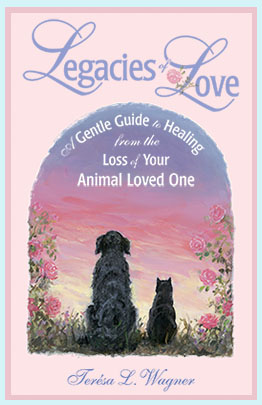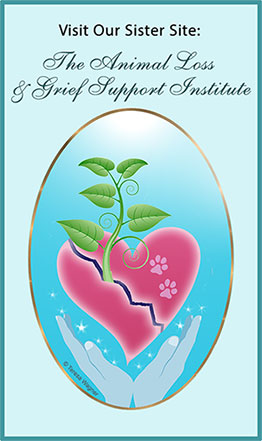Tips to Support Others Who Grieve
Practical Do's and Don'ts

It is said that when two friends have walked hand in hand through the shadow of a rainbow, their bond is strengthened, and the colors of the rainbow and the world are now brighter, nourished by the loving support beings gave one another during darkness.
Those of us who support grievers of animals do so in various professional and personal roles: grief counselors, support group facilitators, animal communicators, veterinarians and their staff, animal shelter staff, friends, family, co-workers, and acquaintances. These specific roles often dictate the intensity, frequency and boundaries of the form of our grief support, and the relevance of the suggestions listed below:
Please DO:
- Remember that grief is indifferent to the species lost.
- Honor and accept that the griever may love and regard animals as much as humans. Never assume that another's values about animals are the same as yours. This is especially important if the griever views animals equal to humans, as equal family members, and you don't.
- At any moment, accept them where they are with their grief:
- In shock, in denial, in tears, in deep anguish, in anger, in depression. . .not where you think they should be or where you might be if it were you. This is their grief, not yours, and it is theirs to heal. The most powerful way you can help them heal is to provide a relationship in which they find non-judgment, genuineness, and respect for their feelings, values, and experiences.
- Get in touch to acknowledge that a loss has occurred.
- Express your care and concern in some overt way: call, email or write. Tell them you care, that you're sorry, that you know this must be very, very hard for them. Use the animal's name in your comments and conversations. The very sound of the name could be precious to the griever and personalizes your comments.
- Offer to be with them:
- "If it's OK I'll stay with your for awhile"
- "I'll be happy to go with you when you take him to the vet"
- or "I'd be happy to come over."
- Offer to talk by phone:
- "I'm here if you want to talk"
- or "When I call you, it's OK to say you don't feel like talking."
- Offer to listen:
- Ask gentle, open ended questions and then listen.
- "Would you like to talk about what happened?"
- "Tell me what happened?"
- or "What's the hardest part for you?"
- Write a note or letter.
- As important as physical presence and phone calls may be, sentiments in writing are lasting, and can be comforting again and again over time. Include your sense of sorrow for your friend or loved one, perhaps stories you remember about their animal, or perhaps a poem about animal loss or grief.
- Stay in touch over time.
- Too often, after the initial death, burial or service, support seems to wane. Make a reminder calendar for yourself to get back in touch perhaps in a week, month, six months, etc., and definitely on the year anniversary.
- Hold them in hour heart.
- Include them in your spiritual practices such as prayer, Reiki, or meditation. Send them your love.
- If you are also grieving this animal (i.e. this was your dearest friend's animal and you loved and knew her too), do NOT expect the primary griever to support you!
- As a "secondary griever" you also need and deserve support and should seek it. The primary greiver, however, may be in no emotional condition to provide it and should not be expected to. Be sure to reach out elsewhere for yourself. When we are secondary grievers we carry dual roles of griever and supporter simultaneously. It's important to acknowledge the difference between these roles and seek support from appropriate sources.
- Take time to learn something about grief to help you understand their experience.
- But don't make comments like, "Oh, you must be in stage two." Books and models about grief can be very helpful roadmaps to help us understand our journeys. Remember though, there are many roads to Rome. If your friend or loved one were traveling to Rome, it may help you to be familiar with the atlas so you can better follow along with the stories of their journey, but don't impose your ideas about the best way to get there.
- Accept the griever's style and time.
- Not everyone expresses their grief the same way. Some people want lots of contact, some want privacy. Some will describe feeling at peace with their loss almost immediately and others not for many months or much longer. Whether similar or different from "our way", we need to just be with the other, allowing them the space to heal in their own way.
- Offer the healing power of touch.
- If you know the griever well, you probably have established boundaries about hugging and touching. When you know being touched is OK with the person touch them. The loss of an animal always includes loss of touch. . . so being touched now, for those who want it, can be a very powerful and welcome form of support. If you don't know someone's comfort with touch, you might softly ask, "Would you like a hug?" Sometimes a warm touch to the hand or shoulder can send a strong message of support.
- Let the griever know it's OK to cry with you.
- Show comfort with their tears. Tell them "It's OK to cry with me", "Take your time, it's OK, cry." It's OK for you to cry with them too.
- Listen a lot, talk a little.
- Learn to be comfortable with silence. Don't fill in silence with chatter, or deep questions about healing grief (especially if you are not their therapist). Let yourself be taught by the griever about their experience. Whatever our experiences as helpers or grievers, no two experiences of loss are the same. Ask gentle, open ended questions to allow (not force) the expression of their unique grief to unfold. Early grievers may be incoherent or disoriented. Be willing to hear their story over and over.
- Invite the griever to tell you stories about their animal who has died.
- This may be stories of the illness and death, or memories of their life. "What is it you loved the most about Bud," or "What was Muffin like when he was little?"
- Share your own memories and stories of their animal.
- It helps the griever to remember that others know and loved their animal too.
- Ask "How are you feeling today?" vs. "How are you?"
- The latter almost always evokes "Fine," while the former is more likely to elicit a natural, honest response.
- Offer practical help they value.
- The key issue is what they value. It's very important to offer vs. impose, and confirm what they really need vs. guessing. Almost any griever could use some practical help. Grieving is emotionally and physically exhausting. However, when someone says, "Let me know if there is anything I can do," most grievers are either too tired to think of what they need at the moment or feel too embarrassed to ask you to make a meal or help with baby-sitting. That's why it can help, especially when you live close by, to offer to help with specific errands or chores you know to be part of their lifestyle. If you're truly willing to give time and energy for practical help, let your grieving loved one know you really mean it.
- If feelings of guilt are expressed, listen,
- and allow their thoughts and concerns a chance to become clarified through your discussion. Sometimes we all make mistakes and regret things we did or didn't do. Coming to terms with regrets is a critical task of grief reconciliation. Don't quickly discount a griever's guilt because you don't want them to hurt. Be there to listen, ask non-judgmental questions to help them work it out themselves. You cannot take their guilt or pain away, but by listening unconditionally and being present you can help them heal it themselves. If a griever expresses their feelings of guilt to you, saying, for instance, "I feel so guilty and bad that I should have had him euthanized sooner. I'm so afraid he suffered", resist temptation to respond with "You did the best you knew at the time", attempting to assuage their guilt. Instead, invite them to explore their guilt, the logic or illogic of it, on their own. You might ask something like, "Tell me about how it was for you, what was going on, when you were making that difficult decision." This allows them to explore their guilt rather them us imposing our view, our need to lift our discomfort with their pain.
- Offer resources.
- Perhaps give them a book, tape, or video on grief. You can also call your local SPCA for a list of animal loss support groups and local therapists specializing in grief. Visit our Grief Support Resources section for specific ideas. An important note about mourning gifts: be sure your expressions of condolence are aligned with the beliefs of the griever, not necessarily your own beliefs. For instance, be careful not to send a tape about reincarnation of animals, however comforting it may be to you, if the griever is known not to share those beliefs. Or to send a card with phrases about "your loved one is now with the Lord" to someone who is not Christian. However well meaning, sometimes receiving cards or gifts with messages different from our spiritual beliefs can be disconcerting or even insulting.
- Be honest about any feelings of awkwardness or helplessness.
- Your genuineness will allow the griever to be open and genuine with her feelings too. It's OK to say, "I feel helpless to help you. I wish I could take your pain away, but I know I can't." One caution: don't look to the griever to support you through your feelings of helplessness, etc. Remember, this is not a time to expect any support from the griever. Seek support you need elsewhere.
Please DON'T:
- Use clichés:
- The #1 resented cliché: It was just a cat (dog, horse, rabbit, bird, etc.) You can get another one.If these words represent your belief system, you should definitely not put yourself in the role of attempting to support someone grieving an animal. These words are hurtful, insulting and enraging to someone who loves their animal deeply. To suggest that who has died (or is lost) can so easily be replaced diminishes the value of the animal who died as well as the relationship between the animal and person. If you are a family or friend who is in frequent contact with the griever and these are your beliefs, you'll help the griever by keeping your beliefs to yourself.
- Positive alternative: "I know your animal meant a great deal to you."
- The #2 most resented cliché:
- Version one: "It was God's will."
- Positive alternative: "I will keep you in my prayers" which alludes to using your spirituality to help them but does not impose a specific belief which may be different from theirs or which may offend them. In surveys of the bereaved, even devout Christians reported feeling angry hearing this phrase after losing someone they loved.
- Version two: "Take comfort in knowing your animal chose to go and that there is purpose in everything that happens to us." This is the metaphysical version of "It's was God's will" and is just as harmful. It may very well be the belief of the greiver and/or the supporter. However, unless we absolutely know for sure that our comments referring to spiritual views of loss are also held by the griever, they are better kept to ourselves. Grievers need comfort, not preaching. Grievers need a space of non-judgment to grapple with what might be their own doubting or re- clarifying of their beliefs. It is not a time to impose your views on death and life after death. Be sensitive to the fact that even when a griever holds strong spiritual beliefs about death, this does not prevent overwhelming emotions of anguish and sorrow.
- The #3 most resented cliché: "I know just how you feel."
- Positive alternative: "I can only imagine how painful this must be for you." No matter how similar, no circumstances nor people's reactions about loss are identical. It is trite, condescending, and almost never comforting to hear someone state they know just how we feel. They don't.
- Other common clichés to avoid:
- You're so strong (grievers don't always feel strong and every griever deserves time to feel vulnerable, soft, and wounded, not strong)
- Time heals all wounds
- Be grateful he lived a long life (being grateful for long, happy years together does not preclude anguish and sorrow at the time of separation by death.
- Be grateful you have other animals (being grateful for having remaining animals in our lives does not preclude anguish and sorrow at the time of losing this one)
- At least she didn't suffer (lack of suffering does not preclude sadness of the time of death)
- Don't cry
- You'll get over it
- A helpful book on common clichés of grief and alternative positive comments is I Know Just How You Feel by Erin Linn, available from Compassion Books at 828-675-5909 or www.compassionbooks.com
- Soon after the death, avoid talking about unrelated trivia, the joys of your animal, or your own good fortunes in the presence of the griever. To a recent griever, the whole world may seem dark and sad, and to be expected or forced to participate in others' joys or trivia can be overwhelming or provoke resentment. Of course, if the griever initiates talking about these issues, go where they want to go conversationally.
- Don't compare this person's grief to another's (i.e. "at least you know what happened with Fluffy. Remember so and so's dog got lost and she never knew what happened. ..) It is true that some losses seem more tragic and hard to accept than others. Though a death from old age may be less startling than the death of a young animal from an accident, it's unfair and unhelpful to suggest to a griever that they should feel less sorrow (or no sorrow) because "it could have been worse."
- If you give a gift of a support resource such as a book, don't ask (especially early on) how they liked it. This may make them feel obligated to say they like it, or to be forced to read it when they don't have the energy. Perhaps they are not ready. All forms of support should be offered without attachment to whether the griever likes them or uses them.
- Don't interrupt, change the subject, or appear impatient. Grievers may ramble, repeat themselves, or be incoherent. That's OK and to be expected for a time. Just listen. Their heart and mind may feel to them to be in complete chaos. Allow that. Don't try to force them to sound rational. That makes as much sense as trying to force a friend with a broken leg to get up and walk because we're uncomfortable seeing them just sitting there. Just be with them, as they are and let them heal.
- Don't expect grievers to do all the things they used to do for awhile. A serious loss effects the body, mind and spirit. Grievers need time to rest, rejuvenate, reflect.
- Don't tell them YOUR story of animal loss. This is their grief, their loss. If you've truly had a similar loss, perhaps a brief comment such as "I remember how hard this was for me. I can only imagine how difficult it must be for you now." But not your whole story! If this griever's experience is provoking old feelings of grief for you, which is very common and certainly normal, go elsewhere for support. Go elsewhere to tell your story again and complete your grief. An active greiver is not helped by hearing the details of your story right now. They need all their energy to live through their own. If they ask you about your loss, go ahead and tell them. Tell it in the context, however, of supporting them, not seeking support from them.
- Don't expect others to grieve like you do. Be alert and sensitive to their personality and unique needs. For instance, if you know the griever to be an extroverted, feeling type person, give them ample opportunity to talk and vent. If on the other hand you know them to be more introverted, give them plenty of space and privacy. In any case, do not assume this griever's needs are the same as yours.
- As time goes by, don't pretend that a serious loss did not occur by never mentioning it. Too often, after the initial flurry of a service, cards, and some calls, grievers are left alone. Try asking, "How are you feeling about Fluffy's now?" or "What's it been like for you since we last talked?" Don't avoid the subject because you're afraid you'll remind them their animal died. You don't need to remind them ~ they didn't forget. Showing that you remember, too, can be extremely supportive.
- Don't stop a griever's crying by prematurely hugging them, saying "Don't cry," however lovingly you may say it. Grievers need to cry. It's natural, normal and healthy to cry. Some studies show that certain hormones are released from tears of sadness which are not released from tears caused by allergies or onions. As supporters we need to learn to be comfortable in the presence of another's pain, knowing that just being there, not doing, not fixing, but just being there is helpful to the griever. If you have an established go-ahead to hug this person, hug them (if not, ask if they'd like to be hugged), touch their hand or shoulder and tell them, "It's OK to cry with me," or "cry all you need to." If you have a very close relationship it can be very comforting and healing to hold them, and even rock them as they cry.
- Don't expect a griever to feed you, cook for you, or entertain you when you visit. Their capacity for energy output may be quite different for awhile. Just be present with them.
- Don't go to the griever for support for your own issues while they're initially grieving (this could be several weeks or more). This doesn't mean be artificial and pretend you don't also have a life and issues to deal with. Talk naturally with your friend, but consciously hold back from actively seeking their support on stressful issues and problems. A griever needs and deserves every ounce of energy they have to heal. Be careful not to deplete them with your needs right now. When someone we love or care about is in crisis such as grief, it's not a time for fifty/fifty give and take in the relationship. This is a temporary time for you to give, not receive. Except for the love we receive from giving!
- Don't be invasive with your support. For instance, don't assume it's OK to just drop by their house. Even it that's an already established norm in your relationship, the griever may need some space right now and may resent the intrusion. Check, ask what form of support they want and need.
- Don't avoid them because you're uncomfortable with grief. Be honest and express any feelings of awkwardness or feeling not quite sure what to do, but express a desire to support in some way. Most grievers will appreciate your genuineness. If you are an acquaintance, perhaps just send a card or note. If, however, you are a family member or close friend with a current intimate relationship with the griever, your relationship with this person is at great risk of being damaged if you are unwilling to at least try to learn to support them. Crises often create crossroads in relationships. If your grieving loved one experiences you as keeping your distance in his or her time of need, you may later find yourself estranged. Many grievers have expressed feeling abandoned by loved ones, making their pain greater. Don't let intense feelings scare you off. Your loved one needs you now more than ever.
- Don't try to make the griever "forget about it" by keeping them busy. This is different from offering to go out or get involved in some activity, especially if the griever wants to. Always look to the griever to "teach you" where they are in their process, what they need on a given day. This means careful listening, gentle question asking, astute observing, and not pushing them to "be active." Often, grieving requires periods of quiet reflection and alone time.
- Don't tell a griever "It's time to move on." What does that really mean anyway? Usually that statement means that the speaker is uncomfortable with whatever remaining grief work the griever is experiencing. Or uncomfortable with how much time it's taking for them to reconcile their grief. Or the way in which the griever is grieving. Nobody, NOBODY, except the griever knows when it's time to move on. And what is moving on? It's when the griever is ready to re-direct their energy again to other issues beyond their grief: other animals, perhaps even a new animal, other people. projects. It's when the major focus of the energy in their heart and mind is not the animal who is gone. It means that they are now ready to define themselves as someone who can function and be at peace in a world without whom they've lost. Moving on doesn't happen until the griever has completed the earlier tasks of grief recovery: coping well and completing the emotional relationship with the animal who has died. If your concern is not merely that your loved one is not grieving as fast as you would like, but more a concern that he or she is "stuck" or experiencing "complicated grieving," then you might gently, non-judgmentally, and without attachment to the outcome, offer resources for support such as books, tapes, support groups, therapists, etc.







